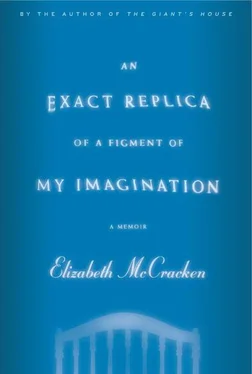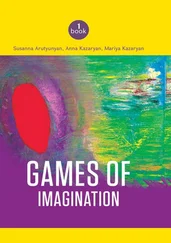Of course it felt familiar, as wretchedly presumptuous as that sounds. I’d spent the fall and winter feeling only the most cautious of emotions. A gleam of hope, a spike of fear, slantwise guilty grief. One day’s worth of feeling at a time. Surely grand emotion is more than twenty-four hours’ worth, grief compounded with interest, joy magnified by anticipated returns. In New Orleans, I found it extraordinary to be surrounded by great sadness. The people we saw, old friends and strangers, had left and come back, and now they were waiting for the next disaster, the next murder, the next hurricane, the next levee failure, the loss of their home, the revocation of their homeowner’s insurance, and still of course at the same time they had to hope. Hadn’t they come back for that reason, because they hoped?
Me, too: same place, remembering the disaster, trying to believe it would not come for me again.
At a reception that week, I was chatting with the exceptionally lovely, soft-spoken woman who’d donated the money for the program that had brought me there. We sat in folding chairs against a wall, a few feet from the buffet table. Just small talk. She asked me how my pregnancy was going. Then she said, “I was so sorry when I heard about your first child. My first child was stillborn, too.”
My heart kicked on like a furnace. Suddenly tears were pouring down my face.
“Oh no!” said the woman. “I didn’t mean for that to happen!”
I laughed and grabbed some napkins from the table and tried to explain myself, though even now it’s hard to find the words. What came over me was gratitude and an entirely inappropriate love. I didn’t know the woman, but I loved her. I’d felt the same thing meeting another couple on campus, a professor and his wife who’d written me when Pudding died to send condolences and to say that they’d had a daughter who was stillborn nearly thirty years before.
All I can say is, it’s a sort of kinship, as though there is a family tree of grief. On this branch the lost children, on this the suicided parents, here the beloved mentally ill siblings. When something terrible happens, you discover all of a sudden that you have a new set of relatives, people with whom you can speak in the shorthand of cousins.
Twice now I have heard the story of someone who knows someone who’s had a stillborn child since Pudding has died, and it’s all I can do not to book a flight immediately, to show up somewhere I’m not wanted, just so that I can say, It happened to me, too, because it meant so much to me to hear it. It happened to me, too, meant: It’s not your fault . And You are not a freak of nature . And This does not have to be a secret .
That’s how it works. When a baby dies, other dead children become suddenly visible: Daughters and sons. First cousins. The neighbor kid. The first child. The last child. Your older brother. Some of their names have been forgotten; some never had names in the first place. They disappeared under heaps of advice. Don’t dwell. Have another child, a makeup baby. Life is for the living. But then another baby dies, and here they are again, in stories, and you will love them all, and — if you are the mother of a dead child yourself — they will keep coming to you. A couple I know just lost their baby. And you will know that your lost child has appeared somewhere else in the world. I know a couple. .
All those dead children. Who knows what they want?
In our better moments, we surely understand that the dead do not need anything. Afterlife, no afterlife: the dead have their needs taken care of. Oh, but isn’t wanting things something else again, and don’t we talk about it all the time. It’s what he would have wanted. Her last wishes. Thank God for the dead; thank God someone is capable of making a decision in the worst of times: He would have liked it that way.
But a baby. Who’s to say? Babies are born needing everything. They’re a state of emergency. That’s what they’re for. Dead, there’s nothing we can do for them, and we don’t know what they’d want, we can’t even guess. I can pretend that I knew Pudding. No, I did know him, not with my brain but with my body, and yet I know nothing about him, not even the simplest thing: I have no idea of what he’d want. And so in my grief I understand that mourning is a kind of ventriloquism; we put words into the mouths of our bereavers, but of course it’s all entirely about us, our wants, our needs, the dead are satisfied, we are greedy, greedy, greedy, unseemly, self-obsessed. If your child did not survive his birth, everyone can see that clearly. I want. I need. Not him. No pretending.
I thought stillbirth was a thing of history, and then it happened to me, and yet now when I hear of a baby dying I’m just as incredulous. You mean they still haven’t figured this out? I want to hear about every dead baby, everywhere in the world. I want to know their names, Christopher, Strick, Jonathan. I want their mothers to know about Pudding.
The dead don’t need anything. The rest of us could use some company.
When I was about thirty-six weeks pregnant the second time, Edward mentioned that his grandmother had been named Mabel. I’d known this, of course, but forgotten.
“Mabel,” I said. “Mabel. Mabel!”
We’d scarcely discussed names at all. In the back of our heads, we remembered the boy names we’d come up with for Pudding, both of us leaning toward the names we’d rejected early in the process, like Moses and George. For five minutes we’d discussed girl names and come up with Lucy, Beatrix, and Penelope. That was all we could manage. We didn’t joke about names the way we had the first time — Fatty Harvey, Phineas T. Harvey, Charles Laughton Harvey. We didn’t joke much at all. All of the jokes we’d made when I was pregnant with Pudding had to be retired, and it was hard to come up with new ones.
But now Mabel was in my head, and I was a little in love with it. I called Ann and Lib and got their reactions. (They loved it, or at least said they did. Lib declared that she would call our baby Mabel no matter the gender.) Mabel, I thought. I pictured a little girl named Mabel — not necessarily our little girl named Mabel, but an ordinary everyday Mabel. You had to love a little girl named Mabel. I hadn’t felt this way about any of the other little-girl names. I’d never felt this about any of the little-boy names of a year before, not even my favorite of the lot: Oscar. Sometimes I said to Edward, in a voice full of meaning, “Mabel.”
“Maybe,” he said.
I rubbed my stomach. “Mabel?” I said. “Do I love ‘Mabel’ because you’re a Mabel?”
Thump thump, went the obliging, enigmatic baby.
Over the past year and over my second pregnancy, of course I thought about Pudding all the time, every day, possibly every waking hour. (It’s possible I still do think of him every waking hour, and if I were the kind of new mother who kept track of things — diapers, feedings, naps — I could mark down thoughts of first child as well.) But mostly I didn’t think about the details of his death. If I climbed into that pit, I’d never crawl out, I’d have been at the ob-gyn practice every single day, begging Dr. Knoeller for an ultrasound, a sedative, an emergency C-section. I wasn’t counting my chickens, this one chicken, this essential chicken — but I wasn’t imagining heart-stopping scenarios, either.
Then it was early April.
Then it was mid-April.
I’m not a fool. I could see the end of April coming toward me. We’d known all along I’d be induced, and I’d said that I wanted to avoid the end of April, particularly April 27, not for my own sake but for the kid’s: it seemed like a too weighty fact to have in your biography, being born a year to the day after your brother who didn’t survive, the sort of thing I wouldn’t countenance in a modern novel. And then I said, Who cares, I don’t care, whatever happens, I’ll accept it. Dr. Knoeller had already suggested May 2, when I would be thirty-eight weeks and two days pregnant and she would be on call. But as she pointed out, I could go into labor before that.
Читать дальше












